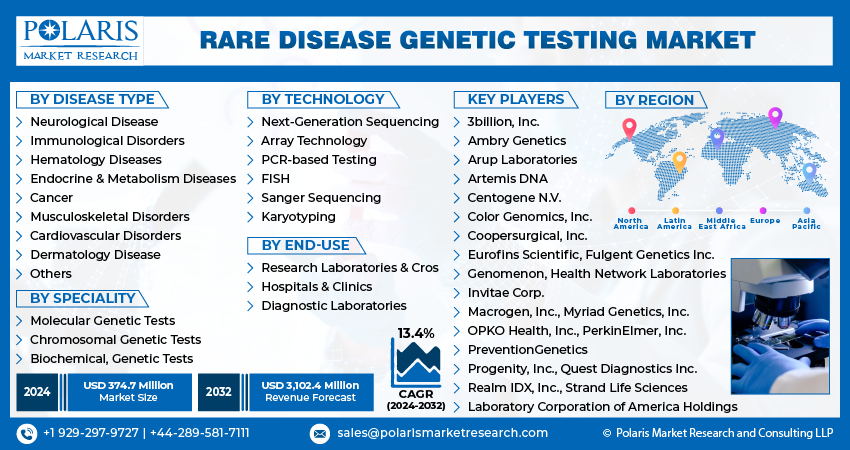The global Rare Disease Genetic Testing market size is expected to reach USD 3,102.4 million by 2032, expected to grow at a CAGR of 12.70% during the forecast period.
The Rare Disease Genetic Testing Market has witnessed significant growth due to advancements in genomics, increasing awareness of rare diseases, and the growing need for accurate and early diagnosis. Rare diseases, defined as conditions affecting a small percentage of the population, are often difficult to diagnose due to their complexity and the lack of standardized testing protocols. Genetic testing has emerged as a crucial tool for identifying the underlying causes of these diseases, enabling better patient management and tailored treatments.
Market Growth Drivers
- Advancements in Genomic Technologies: The development of high-throughput sequencing methods, such as NGS, has revolutionized the identification of rare genetic disorders.
- Increasing Prevalence of Rare Diseases: According to the World Health Organization (WHO), approximately 300 million people worldwide are affected by rare diseases, underscoring the demand for diagnostic tools.
- Rising Awareness and Advocacy: Patient advocacy groups and awareness campaigns have emphasized the importance of early and accurate diagnosis, boosting the adoption of genetic testing.
Some of the major players operating in the global market include:
- 3billion, Inc.
- Ambry Genetics
- Arup Laboratories
- Artemis DNA
- Centogene N.V.
- Color Genomics, Inc.
- Coopersurgical, Inc.
- Eurofins Scientific
- Fulgent Genetics Inc.
- Genomenon
Download Free Sample PDF Copy of the Report:
Key Trends
- Next-Generation Sequencing (NGS): NGS has become a cornerstone in rare disease genetic testing due to its ability to analyze multiple genes simultaneously with high accuracy.
- Integration of AI and Data Analytics: Artificial intelligence and machine learning are being used to interpret genetic data, improving diagnostic accuracy and efficiency.
- Emergence of Whole-Exome and Whole-Genome Sequencing: These comprehensive approaches are increasingly utilized to identify rare genetic variants that traditional methods may miss.
Recent Developments
- In February 2022, Bionano Genomics has recently introduced the Rare Undiagnosed Genetic Disease (RUGD) initiative, aiming to enhance the commitment and emphasis on clinical and translational research.
- In November 2021, Genomenon collaborated with Alexion to empower the genetic testing laboratories with the data they need to diagnose rare diseases.
𝐒𝐞𝐠𝐦𝐞𝐧𝐭𝐚𝐥 𝐀𝐧𝐚𝐥𝐲𝐬𝐢𝐬:
The research study includes segmental analysis that divides the market into distinct groups or segments based on common characteristics. With market segmentation, businesses can identify specific customer groups that are more likely to be interested in specific products or services. Also, it enables these businesses to focus their marketing efforts and resources more efficiently, leading to higher conversion rates and improved return on investment. Furthermore, segmentation analysis helps companies develop personalized products or services, which can result in increased customer loyalty and improved customer satisfaction.
Rare Disease Genetic Testing, Disease Type Outlook (Revenue – USD Million, 2019 – 2032)
- Neurological Disease
- Immunological Disorders
- Hematology Diseases
- Endocrine & Metabolism Diseases
- Cancer
- Musculoskeletal Disorders
- Cardiovascular Disorders
- Dermatology Disease
- Others
Rare Disease Genetic Testing, Technology Outlook (Revenue – USD Million, 2019 – 2032)
- Next-Generation Sequencing
- Whole Exome
- Whole Genome
- Array Technology
- PCR-based Testing
- FISH
- Sanger Sequencing
- Karyotyping
Rare Disease Genetic Testing, Speciality Outlook (Revenue – USD Million, 2019 – 2032)
- Molecular Genetic Tests
- Chromosomal Genetic Tests
- Biochemical, Genetic Tests
Rare Disease Genetic Testing, End-use Outlook (Revenue – USD Million, 2019 – 2032)
- Research Laboratories & Cros
- Hospitals & Clinics
- Diagnostic Laboratories
The Rare Disease Genetic Testing Market is poised for robust growth as genomic technologies evolve and awareness of rare diseases increases. With ongoing advancements in testing platforms, the integration of AI, and supportive policies, the market offers immense potential to transform the diagnosis and treatment landscape for rare diseases. Stakeholders in the healthcare and biotechnology sectors are uniquely positioned to capitalize on these opportunities, driving innovation and improving patient outcomes worldwide.
More Trending Latest Reports By Polaris Market Research:
Laboratory Proficiency Testing Market

